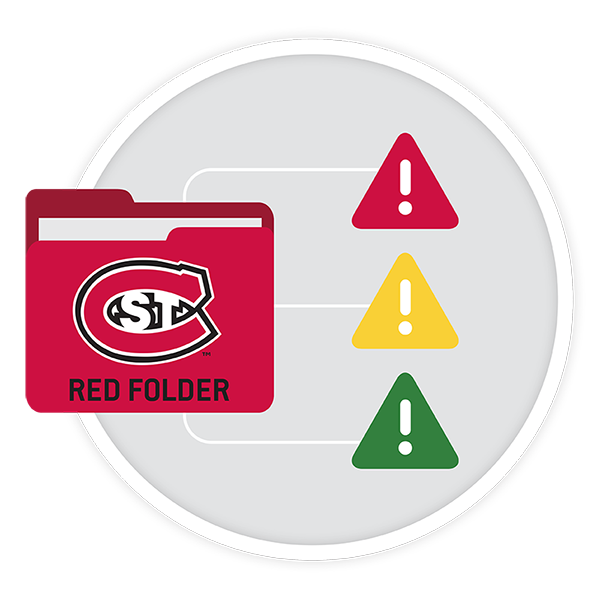Supporting Student Wellbeing
Red Folder
Faculty and Staff Role: Supporting Students in Distress
Faculty and staff members are often the first to recognize and reach out to students in distress. In your interactions with students, you may identify indicators of distress or behaviors inconsistent with your typical experiences with that student.
Reaching out to a student in distress by communicating your concern and interest in their well-being is an important first step in supporting them and making a successful referral to the appropriate campus and/or community resources.
Understand the limits of your responsibility when supporting a student in distress. You are not expected to provide personal counseling to students or be responsible for solving their issues or concerns. This folder helps you recognize indicators of student distress and make a successful referral to the appropriate campus resource.
Establishing boundaries about your role in supporting the student is important. It allows you to maintain professional working relationships, support your personal mental health, and develops self-efficacy for the student in connecting them to resources and support. Connecting students to relevant and appropriate campus resources can also help to foster a sense of community, belonging, and greater trust in the St. Cloud State University campus.

Response Protocol: Follow these guidelines to determine how to proceed.
Disruptive Student Behaviors
A student’s behavior is reckless, disorderly, dangerous, or threatening and interferes with academic and University operations and functions.
If you have a student who is disruptive but does not pose a threat, begin to deescalate the situation. Explain what behavior is expected and that if the disruptive behavior continues it may result in a violation of the Code of Community Standards. In your communication with the student, appear calm, use non-confrontational language, and avoid threatening, humiliating, or intimidating responses. If the behavior persists you can ask the student to leave and share with the student that a refusal to leave may result in an additional violation of the Code of Community Standards. If you believe there is a risk to safety or security, call Public Safety (320-308-3333). Report the incident to the Dean of Students Office or through an Incident Report.
Confidentiality and Student Privacy
The Family Educational Rights and Privacy Act of 1974 (FERPA) does not prohibit the disclosure of observations and knowledge about a student amongst University officials when there is a legitimate safety concern. You can consult with the appropriate campus resource (Husky ACT, CAPS, Dean of Students, Public Safety, etc.) for more support, suggestions, resources, and assistance.
If you make a Husky ACT Referral you will receive confirmation of its submission. Additional follow-up information will be shared as necessary to protect the health, safety, and privacy of the student and in accordance with FERPA, HIPAA (as applicable), and within established University guidelines and legal professional standards of confidentiality.
 The student’s behavior presents an immediate risk to their personal safety and/or to the safety of others as indicated by reckless, disorderly, dangerous, or threatening behaviors.
The student’s behavior presents an immediate risk to their personal safety and/or to the safety of others as indicated by reckless, disorderly, dangerous, or threatening behaviors.
